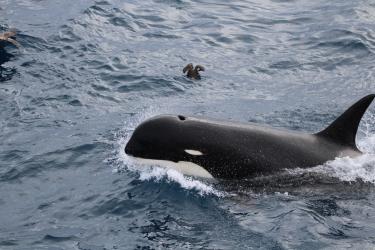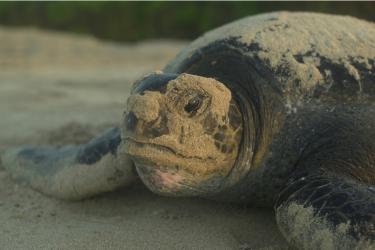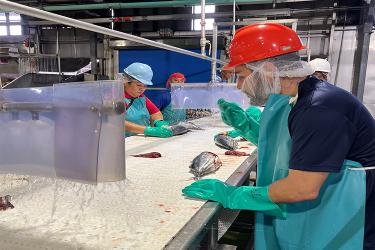World Fisheries Day explores moves countries are taking together to find solutions to the increasingly inter-connected problems in our fisheries. Because fish and other marine wildlife cross national boundaries, the way countries manage their marine resources affects the status of fish stocks and protected and endangered species.
NOAA Fisheries’ international affairs work builds strategic fishing partnerships with foreign nations to promote sustainable and responsible management of fisheries and other relevant marine resources. Our efforts shone this year—from tackling the scourge of IUU fishing, to setting global standards to decrease marine mammal bycatch—all while representing America’s interests.
Tackling Illegal, Unregulated, and Unreported Fishing
Illegal, unregulated, and unreported fishing practices damages nations’ economies, hurt fishermen who play by the rules. They threaten global food security, and rob us all of precious ocean resources. These activities can occur at various points through the international seafood supply chain. For that reason, our efforts to combat them must be multi-pronged.
In 2018, we established the first-ever U.S. Seafood Import Monitoring Program. The program requires documentation from the point of harvest to the point of entry into U.S. commerce for 13 species of seafood particularly vulnerable to IUU fishing. This provides a way to trace seafood entering our domestic supply chain—deterring and combating illegal fishing activities. In 2020, we released a new accompaniment to the program—the SIMP-Compliant Importers List. The list recognizes U.S. importers with a demonstrated history of excellent audit compliance with the SIMP requirements. It reduces costs to both the government and industry while incentivizing importers to maintain the reporting and recordkeeping requirements of SIMP.
Globally, NOAA Fisheries is a leader in analyzing foreign fishing activities on the high seas. Every two years, we issue a Report to Congress that identifies nations whose vessels have been identified as engaging in IUU fishing. We then work with those nations to correct the identified problems. We will release our next report in 2021.
Domestically, NOAA Fisheries collaborates regularly with our U.S. government colleagues in addressing IUU fishing activities. The Maritime Security and Fisheries Enforcement (SAFE) Act passed in December 2019, implementing a government -wide approach to counter IUU fishing and related threats to maritime security. Section 3551 of the Act requires the establishment of an Interagency Working Group to strengthen maritime security and combat IUU fishing. NOAA Fisheries is the first chair of the Working Group, bringing together 21 agencies from across our government to provide an integrated response. The Working Group recently released its work plan and launched a series of public-private engagements.
Representing America’s Fishing interests
Often overlooked, but as damaging to our ocean resources, are the Us in IUU fishing. Unreported and Unregulated fishing refers to fishing activities that are not reported, sufficiently regulated, or are misreported to relevant authorities. That makes it difficult for scientists to assess the health of fish stocks and populations and for managers to develop better management tools. NOAA Fisheries participates in various international and regional fisheries bodies, like the International Commission for the Conservation of Atlantic Tunas (ICCAT). These bodies promote international cooperation to achieve effective, responsible marine stewardship and ensure sustainable fisheries management.
In fall 2019, ICCAT adopted its first-ever rebuilding programs for Atlantic blue marlin and white marlin stocks at its annual meeting. Our efforts ensured that the agreement protected U.S. fishing interests while immediately ending the overfishing of these depleted stocks. Consistent with scientific advice, the rebuilding plan:
- Takes into account fish that are caught and discarded
- Improves data collection
- Advances gear studies to reduce bycatch of these species
Global Standard to Minimize Marine Mammal Bycatch
We continue to work with hundreds of nations in preparing for the implementation of the Import Provisions of the Marine Mammal Protection Act. These provisions require that, by 2022, nations exporting fish and fish products to the United States must meet comparable fishing standards for protecting marine mammals to those followed by U.S. fishermen. A key challenge nations have had in addressing marine mammal bycatch has been the lack of global data, particularly species-specific data. In our ongoing work to enforce these provisions, NOAA Fisheries has created the first-ever List of Foreign Fisheries. This is an unprecedented analysis of thousands of foreign fisheries that export fish and fish products to the United States.
In 2021, NOAA Fisheries will begin its review of more than 3,000 foreign fisheries. The review will cover 131 nations' regulatory programs that address marine mammal bycatch in commercial fishing operations. The work we do addresses the most immediate threat to many populations and species of marine mammals. It also elevates the global standard to minimize marine mammal bycatch.
As World Fisheries Day celebrates the interconnectedness of our global fisheries, we know that none of the work we do could be achieved without bilateral engagements, participation in regional fishery management organizations, multilateral conservation fora, and scientific exchanges between the United States and its foreign partners.
Alexa Cole
Director for NOAA Fisheries Office of International Affairs and Seafood Inspection





